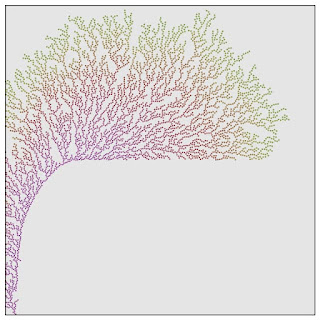It's an example animation using my poor man's DLA algorithm.
No noise() and no random()!
It's a creative coding example of my poor man's DLA algorithm.
I wrote an article 'The poor man's DLA (Diffusion Limited Aggregation).' that explain how to make a image similar DLA without Brownian motion nor random moving.
I played with this method and found some interesting results. I picked one of them and made an animation. And I tried to unuse the 'random()' and the 'noise()' in this code.
The 'Processing' code example (Java).
This code does not display any images on the screen but generates image files in frames directory. You can make an animation with these images.
Please feel free to use this example code of the 'Processing' under the terms of the GPL.
To see other works based on my code is my pleasure. And my honor.
/**
* Sitting On Top Of The World.
* draw Yggdrasill with my poor man's DLA
*
* @author @deconbatch
* @version 0.1
* Processing 3.2.1
* created 2019.10.14
*
*/
/**
* Point : Hold a point information.
*/
private class Point {
public float x, y, h; // informations are writable purposely
/**
* @param _x : x-coordinate value of the point.
* @param _y : y-coordinate value of the point.
* @param _hue : hue value of the point.
*/
Point(float _x, float _y, float _hue) {
x = _x;
y = _y;
h = _hue % 360.0;
}
}
void setup(){
size(720, 720);
colorMode(HSB, 360.0, 100.0, 100.0, 100.0);
rectMode(CENTER);
smooth();
noLoop();
}
void draw(){
int plotMax = 5500;
int frmMax = 24 * 10;
int walkMax = width * 2;
float pSize = 5.0;
float pHue = System.currentTimeMillis() % 360.0;
float initDiv = 0.08;
ArrayList<Point> cluster = new ArrayList<Point>();
for (float i = -0.5 ; i < 0.5; i += initDiv) {
cluster.add(new Point(
i * width,
height * 0.5,
pHue));
}
translate(width * 0.5, height * 0.5);
float entryR = -0.1; // entryRadius
for (int plotCnt = 0; plotCnt < plotMax; plotCnt++) {
float plotRatio = map(plotCnt, 0, plotMax, 0.4, 1.0);
entryR += entryR; // * plotRatio;
entryR = entryR % PI;
Point p = new Point(
width * cos(entryR),
height * sin(entryR),
pHue);
for (int walkCnt = 0; walkCnt < walkMax; walkCnt++) {
// walk to the center, make center point lower
p.x -= cos(entryR - cos(entryR) * 0.05);
p.y -= sin(entryR - cos(entryR) * 0.05);
if (checkCollision(cluster, p, pSize)) {
cluster.add(p);
pHue += 0.04;
break;
}
}
// speed up
if (plotCnt % floor(plotCnt * 0.01 + plotMax / frmMax) == 0) {
background(0.0, 0.0, 90.0, 100.0);
drawCluster(cluster, pSize);
casing();
saveFrame("frames/0." + String.format("%05d", plotCnt) + ".png");
}
}
// draw the final frame
background(0.0, 0.0, 90.0, 100.0);
drawCluster(cluster, pSize);
casing();
for (int i = 0; i < 48; i++) {
saveFrame("frames/1." + String.format("%05d", i) + ".png");
}
// for Twitter thumnail
saveFrame("frames/0.00000.png");
exit();
}
/**
* drawCluster : draw the points cluster
* @param _cluster : ArrayList of the Point class.
* @param _size : draw point size.
*/
private void drawCluster(ArrayList<Point> _cluster, float _size) {
float eSat = 80.0;
float eBri = 50.0;
float eSiz = _size * 0.75;
noStroke();
noFill();
for (Point p : _cluster) {
eSat -= 0.004;
eBri += 0.002;
// fill(p.h % 360.0, eSat, eBri, 100.0);
// ellipse(p.x, p.y, eSiz, eSiz);
stroke(p.h % 360.0, eSat, eBri, 100.0);
for (Point c : _cluster) {
float distance = dist(p.x, p.y, c.x, c.y);
if (distance > _size * 0.5 && distance < _size * 1.5) {
strokeWeight(4.0 * _size / (distance * 2.0));
line(p.x, p.y, c.x, c.y);
// fill(p.h, eSat, eBri, 100.0);
}
}
}
}
/**
* checkCollision : check collision between a point and the cluster.
* @return boolean : true = detect collision.
* @param _cluster : ArrayList of the Point class.
* @param _p : a point
* @param _size : size of the point.
*/
private boolean checkCollision(ArrayList<Point> _cluster, Point _p, float _size) {
for (Point p : _cluster) {
if (dist(p.x, p.y, _p.x, _p.y) < _size * 1.0) {
return false;
}
}
for (Point p : _cluster) {
if (dist(p.x, p.y, _p.x, _p.y) < _size * 1.2) {
return true;
}
}
return false;
}
/**
* casing : draw fancy casing
*/
private void casing() {
blendMode(BLEND);
fill(0.0, 0.0, 0.0, 0.0);
strokeWeight(34.0);
stroke(0.0, 0.0, 0.0, 100.0);
rect(0.0, 0.0, width, height);
strokeWeight(30.0);
stroke(0.0, 0.0, 100.0, 100.0);
rect(0.0, 0.0, width, height);
noStroke();
noFill();
}
/*
Copyright (C) 2019- deconbatch
This program is free software: you can redistribute it and/or modify
it under the terms of the GNU General Public License as published by
the Free Software Foundation; either version 3 of the License, or
(at your option) any later version.
This program is distributed in the hope that it will be useful,
but WITHOUT ANY WARRANTY; without even the implied warranty of
MERCHANTABILITY or FITNESS FOR A PARTICULAR PURPOSE. See the
GNU General Public License for more details.
You should have received a copy of the GNU General Public License
along with this program. If not, see <http://www.gnu.org/licenses/>
*/
Yet another example images.










